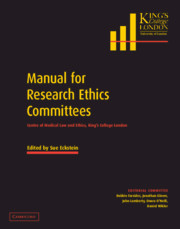Book contents
- Frontmatter
- Contents
- Editorial board
- Acknowledgements
- List of contributors
- Introduction
- Part I
- 1 The ethics of clinical research
- 2 Research ethics committees and the law
- 3 The regulation of medical research: a historical overview
- 4 The regulation of medical research in the UK
- 5 Observational and epidemiological research
- 6 Social survey research
- 7 Approaching qualitative research
- 8 Complementary and alternative medicine: challenges for research ethics committees
- 9 The ethical review of student research in the context of the governance arrangements for research ethics committees
- 10 The ethics of genetic research
- 11 Research or audit?
- 12 Randomised controlled trials
- 13 Determining the study size
- 14 Risk assessment for research participants
- 15 Absorbed radiation in patient and volunteer studies submitted to the ethical committee: a memorandum
- 16 A guide to the use of radioactive materials and radiological procedures for research purposes
- 17 Indemnity in medical research
- 18 The prevention and management of fraud and misconduct: the role of the LREC
- 19 Understanding clinical trials: a model for providing information to potential participants
- 20 The law relating to consent
- 21 Writing information for potential research participants
- 22 The law relating to confidentiality
- 23 Research involving vulnerable participants: some ethical issues
- 24 The ethics of research related to healthcare in developing countries
- Part II
- Index
9 - The ethical review of student research in the context of the governance arrangements for research ethics committees
Published online by Cambridge University Press: 08 January 2010
- Frontmatter
- Contents
- Editorial board
- Acknowledgements
- List of contributors
- Introduction
- Part I
- 1 The ethics of clinical research
- 2 Research ethics committees and the law
- 3 The regulation of medical research: a historical overview
- 4 The regulation of medical research in the UK
- 5 Observational and epidemiological research
- 6 Social survey research
- 7 Approaching qualitative research
- 8 Complementary and alternative medicine: challenges for research ethics committees
- 9 The ethical review of student research in the context of the governance arrangements for research ethics committees
- 10 The ethics of genetic research
- 11 Research or audit?
- 12 Randomised controlled trials
- 13 Determining the study size
- 14 Risk assessment for research participants
- 15 Absorbed radiation in patient and volunteer studies submitted to the ethical committee: a memorandum
- 16 A guide to the use of radioactive materials and radiological procedures for research purposes
- 17 Indemnity in medical research
- 18 The prevention and management of fraud and misconduct: the role of the LREC
- 19 Understanding clinical trials: a model for providing information to potential participants
- 20 The law relating to consent
- 21 Writing information for potential research participants
- 22 The law relating to confidentiality
- 23 Research involving vulnerable participants: some ethical issues
- 24 The ethics of research related to healthcare in developing countries
- Part II
- Index
Summary
Introduction
Students of health care and the biomedical and social sciences generally require some training in the methods of research in their disciplines. At upper undergraduate and postgraduate levels, such training is often deepened by requiring students to carry out research projects themselves. The situation regarding the ethical review of such projects has been unclear in the UK and elsewhere for some time. Recent guidance from the UK Department of Health has created some clarity in this area, but there is still much room for interpretation and debate. In this brief chapter, we discuss this guidance and set out some general principles for the review of student projects.
Student research and research governance
Current thinking on the ethics of research lays great stress on the implementation of effective structures and processes for quality management of research and ensuring that research protects the interests of participants while facilitating wider health services, social and scientific goals. This approach is known as ‘research governance’. In 2000, the UK Government's Department of Health issued guidance on a general approach to research governance throughout the UK National Health Service (NHS), the Research Governance Framework for Health and Social Care. As part of the implementation programme for this framework, in 2001 the Department of Health's Central Office for Research Ethics Committees (COREC) issued Governance Arrangements for Research Ethics Committees (GAFREC).
This replaced previously existing guidance specifying the role and responsibilities of Research Ethics Committees (RECs) in the NHS, and sets out the responsibilities of RECs, researchers and sponsors vis-à-vis the ethics and governance of research projects in the NHS.
- Type
- Chapter
- Information
- Manual for Research Ethics CommitteesCentre of Medical Law and Ethics, King's College London, pp. 53 - 56Publisher: Cambridge University PressPrint publication year: 2003
- 3
- Cited by

